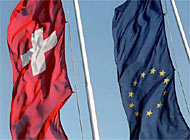EU treaties delayed, but authorities play down impact

The Swiss authorities say there is no chance of a series bilateral free trade accords with the European Union coming into force next January, as Berne had hoped. However, a spokesman said the delay would cause no long term damage.
José Bossard of the Integration Office, which is responsible for all aspects of European integration, said on Thursday it was not possible for the parliaments of all 15 EU countries to meet deadline, but said the impact of the delay had been overplayed.
He told swissinfo that Switzerland would go ahead with the implementation of some measures in the treaties on January 1, even though they will not have been ratified. One of these is a tax on heavy goods vehicles from the EU transiting the country.
“The question of the lorries tax is primarily an internal matter for Switzerland,” he said. “We don’t need to be told when we can go ahead, we can introduce the levy in January, as scheduled. However, we will have to discuss the modalities with the EU beforehand.”
The seven mainly commercial accords cover issues such as transport, the free movement of people and research.
Swiss citizens gave the treaties the go-ahead in a referendum in May, and since then government ministers have been rallying support for early ratification in European capitals.
The agreements were to have been approved by EU parliamentarians in time for the treaties to come into effect in January 2001.
The Integration Office says it is now unlikely they will be implemented before next spring at the earliest. Several countries, including France, have reportedly told Berne their parliaments will not consider the issue before their winter sessions.
Bossard admits one area in particular, Switzerland’s participation in European research programmes, will suffer significantly. “It’s true, if we have to postpone it, that won’t come into effect until 2002,” he said.
The Swiss government has already started discussions with EU leaders on the next set of treaties to be discussed. It is not clear how the delay in introducing the bilateral accords will affect these negotiations.
But Bessard believes that in the big scheme of things, the delay is only a minor setback. “Within the EU there are 15 parliaments, and some – like the Belgian one – have more than half a dozen units. So, it is normal that the process should take several months, and I don’t think it’s such a big deal if a treaty that took many years to develop, now takes just a few months longer to implement.”
swissinfo and agencies

In compliance with the JTI standards
More: SWI swissinfo.ch certified by the Journalism Trust Initiative
You can find an overview of ongoing debates with our journalists here . Please join us!
If you want to start a conversation about a topic raised in this article or want to report factual errors, email us at english@swissinfo.ch.